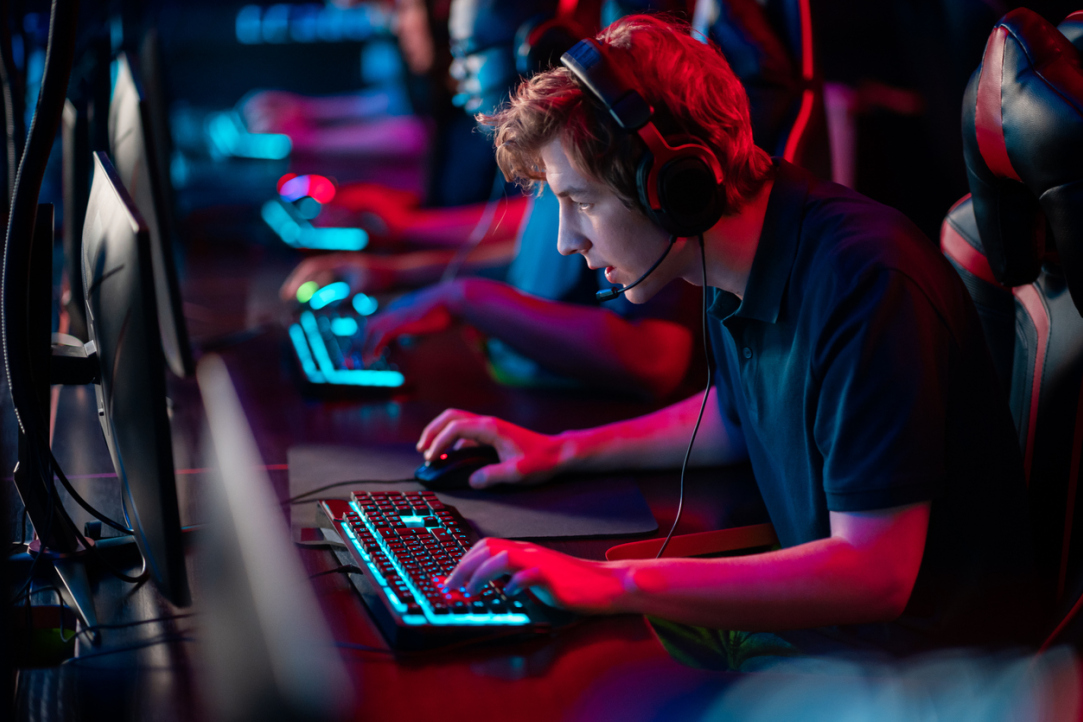Esports Players Play Better Online

In competitions, esports players, like other athletes, face stress and show worse results due to pressure. A substantial decrease takes place in the performance of esports players during overtime. This effect, however, is significantly mitigated in online competitions compared to live events—the difference can reach 30%. A study by a team of authors from HSE University’s Moscow and Perm campuses and European University Viadrina (Germany) explores the phenomenon of choking under pressure within the context of esports. The study was published in the Journal of Economic Behavior & Organization.
Esports is a multibillion-dollar industry with major tournaments and million-dollar prizes. In addition, in Russia, esports has become a priority area of development. As in traditional sports, both technical skills and psychological stability are key to success. Understanding how stress affects the performance of players will help to improve the training process and achieve better results.

Gleb Vasiliev
Gleb Vasiliev, Junior Research Fellow at the Laboratory of Sports Studies of the Faculty of Economic Sciences, Petr Parshakov and Iuliia Naidenova, staff members of the International Laboratory of Intangible-driven Economy at HSE University in Perm, and Igor Tylkin, researcher at European University Viadrina, studied the behaviour of esports players in the game Counter-Strike: Global Offensive (CS:GO).

Petr Parshakov
CS:GO is a competitive online shooter in which two teams of five players compete. Matches are usually played on 1–5 maps, which in turn consist of short rounds. To win the round, teams must either complete a specific task or eliminate their opponents. Usually, 30 rounds are played on one map in competitions. When a team wins at least 16 of them, it wins the map. In the event of a draw, additional rounds are played: at 15:15, overtime starts. The team of scientists analysed players’ behaviour in overtime.

Iuliia Naidenova
The authors studied statistics from almost a million games for the period from 2012 to 2022 among players with both high and low ratings. The sample included more than 1,700 esports players. The researchers used two key indicators.
The first was individual performance, which included the player’s rating (calculated by comparing a player's average performance statistics to the same averages for CS:GO in general calculated over a period of time) and the percentage of accurate shots. These metrics reflect the level of skill in difficult conditions. The second is team coordination, ie cases of ‘friendly fire’ (causing damage to teammates). An increase in the number of hits on teammates may indicate tension and problems with communication in the team. Pressure and stress were measured by analysing overtimes—additional rounds that are played to determine the winner in the event of an equal outcome in matches. As in traditional sports, in extra time, the result of the game most often depends on numerous small factors. In addition, the authors studied the impact of the game format: whether it was an on-site performance or an online tournament. Approximately 70% of the matches were played online, and overtimes were played in 9% of them.
It turned out that overtimes do cause players significant stress. On average, they lead to a decrease in player ratings by almost 2%, and the percentage of accurate shots decreased by 7%. This decline was evident in both professional and novice players. ‘The results of our study show that although experienced players outperform their less experienced counterparts in all game formats, this advantage may fade away in overtime,’ noted the authors. The probability of errors leading to friendly fire also increased.
The tournament format plays an important role. When competitions are held online, with no audience or unnecessary excitement, players perform about 30% better than during on-site matches. Researchers attribute this to a psychological factor—the presence of fans increases stress.
The researchers note that the results of the study can be applied in various fields. For example, it is worth considering that the format of work (on-site or online) significantly influences stress levels and their impact on team coordination and individual results. ‘Esports is a good platform for testing such effects. Players’ high cognitive activity and team coordination are essential in the game, which makes it a convenient object for analysing behaviour under pressure. The study results can be useful for HR departments and crisis management, as well as in fields where teamwork and productivity under pressure are important, such as IT consulting or startups,’ the authors added.
See also:
HSE Researchers Offer Guidance to Prevent Undergraduate Burnout
Researchers at the HSE Institute of Education have identified how much time students should ideally devote to their studies, extracurricular activities, and personal life to maintain strong academic performance without compromising their mental health. An analysis of responses from 2,753 students, combined with their actual academic results, revealed several risk factors—such as excessive homework—as well as positive factors, including sufficient sleep, regular exercise, and moderate participation in projects. Based on these findings, the researchers developed practical recommendations for both students and universities. The paper has been published in the European Journal of Education.
Scientists Discover Why Parents May Favour One Child Over Another
An international team that included Prof. Marina Butovskaya from HSE University studied how willing parents are to care for a child depending on the child’s resemblance to them. The researchers found that similarity to the mother or father affects the level of care provided by parents and grandparents differently. Moreover, this relationship varies across Russia, Brazil, and the United States, reflecting deep cultural differences in family structures in these countries. The study's findings have been published in Social Evolution & History.
When a Virus Steps on a Mine: Ancient Mechanism of Infected Cell Self-Destruction Discovered
When a virus enters a cell, it disrupts the cell’s normal functions. It was previously believed that the cell's protective response to the virus triggered cellular self-destruction. However, a study involving bioinformatics researchers at HSE University has revealed a different mechanism: the cell does not react to the virus itself but to its own transcripts, which become abnormally long. The study has been published in Nature.
Researchers Identify Link between Bilingualism and Cognitive Efficiency
An international team of researchers, including scholars from HSE University, has discovered that knowledge of a foreign language can improve memory performance and increase automaticity when solving complex tasks. The higher a person’s language proficiency, the stronger the effect. The results have been published in the journal Brain and Cognition.
Artificial Intelligence Transforms Employment in Russian Companies
Russian enterprises rank among the world’s top ten leaders in AI adoption. In 2023, nearly one-third of domestic companies reported using artificial intelligence. According to a new study by Larisa Smirnykh, Professor at the HSE Faculty of Economic Sciences, the impact of digitalisation on employment is uneven: while the introduction of AI in small and large enterprises led to a reduction in the number of employees, in medium-sized companies, on the contrary, it contributed to job growth. The article has been published in Voprosy Ekonomiki.
Lost Signal: How Solar Activity Silenced Earth's Radiation
Researchers from HSE University and the Space Research Institute of the Russian Academy of Sciences analysed seven years of data from the ERG (Arase) satellite and, for the first time, provided a detailed description of a new type of radio emission from near-Earth space—the hectometric continuum, first discovered in 2017. The researchers found that this radiation appears a few hours after sunset and disappears one to three hours after sunrise. It was most frequently observed during the summer months and less often in spring and autumn. However, by mid-2022, when the Sun entered a phase of increased activity, the radiation had completely vanished—though the scientists believe the signal may reappear in the future. The study has been published in the Journal of Geophysical Research: Space Physics.
Banking Crises Drive Biodiversity Loss
Economists from HSE University, MGIMO University, and Bocconi University have found that financial crises have a significant negative impact on biodiversity and the environment. This relationship appears to be bi-directional: as global biodiversity declines, the likelihood of new crises increases. The study examines the status of populations encompassing thousands of species worldwide over the past 50 years. The article has been published in Economics Letters, an international journal.
Scientists Discover That the Brain Responds to Others’ Actions as if They Were Its Own
When we watch someone move their finger, our brain doesn’t remain passive. Research conducted by scientists from HSE University and Lausanne University Hospital shows that observing movement activates the motor cortex as if we were performing the action ourselves—while simultaneously ‘silencing’ unnecessary muscles. The findings were published in Scientific Reports.
Russian Scientists Investigate Age-Related Differences in Brain Damage Volume Following Childhood Stroke
A team of Russian scientists and clinicians, including Sofya Kulikova from HSE University in Perm, compared the extent and characteristics of brain damage in children who experienced a stroke either within the first four weeks of life or before the age of two. The researchers found that the younger the child, the more extensive the brain damage—particularly in the frontal and parietal lobes, which are responsible for movement, language, and thinking. The study, published in Neuroscience and Behavioral Physiology, provides insights into how age can influence the nature and extent of brain lesions and lays the groundwork for developing personalised rehabilitation programmes for children who experience a stroke early in life.
Scientists Test Asymmetry Between Matter and Antimatter
An international team, including scientists from HSE University, has collected and analysed data from dozens of experiments on charm mixing—the process in which an unstable charm meson oscillates between its particle and antiparticle states. These oscillations were observed only four times per thousand decays, fully consistent with the predictions of the Standard Model. This indicates that no signs of new physics have yet been detected in these processes, and if unknown particles do exist, they are likely too heavy to be observed with current equipment. The paper has been published in Physical Review D.


